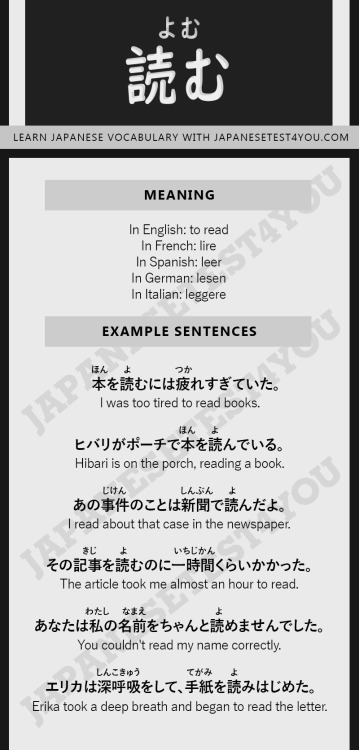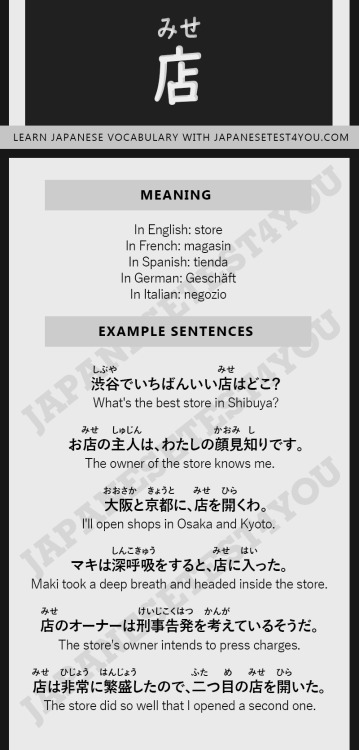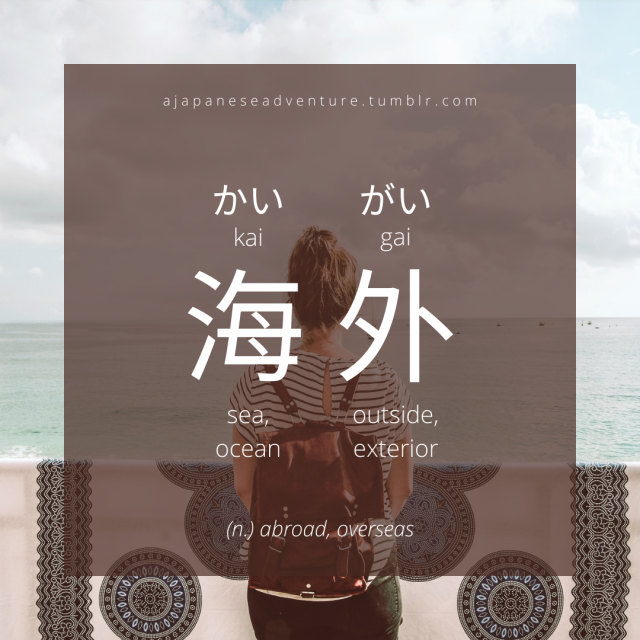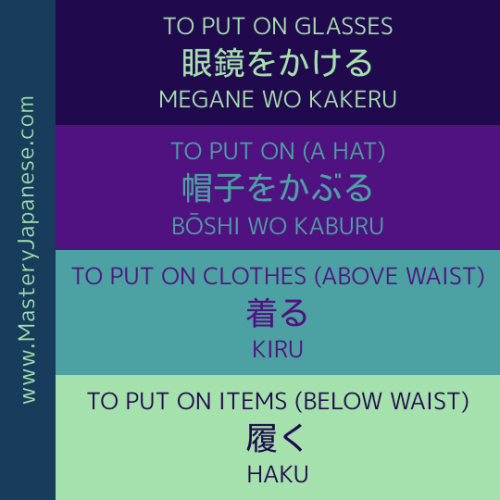#japanese vocabulary
So let’s talk about a problem with learning numbers in Japanese.
You start out doing great. These ones go the same as in English:
- 一(いち) 1
- 十(じゅう) 10
- 百(ひゃく)100
- 千(せん)1000
And then we get to 10000. At this point, English is like, okay we’re gonna slow down and not have a whole word for every single zero we add. This one is just “ten thousand.” No new words for a while.
But Japanese keeps up the fight for one more zero:
- 万(まん) 10,000 (or maybe you should think of it as 1,0000?)
Andthen it breaks down and starts saying things like “ten 万”…which is a hundred thousand. So anyone going between the two languages is kind of f*cked when it comes to thinking about big numbers, because they don’t line up nicely with each other.
How can you fix this? Honestly, I suggest learning/relearning some Big Number Facts and Statistics in Japanese. Knowing how many 万 people there are in your city, for example, can give you some landmarks so you don’t have to count up the whole way every time you see a number like that.
Hopefully these examples can help you get oriented a bit and get you thinking about some trivia you could use for this:
一万(いちまん) = 10 thousand
- Dogs were domesticated maybe 1万4千 years ago. The Ice Age ended about 1万7千 years ago.
- The median US household income is 6万3000 dollars.
- Many towns, suburbs, and cities have a population in this range. What about the ones near you?
十万(じゅうまん)= 100 thousand
- I grew up in a city of around 50万 people. That’s half a million!
- Our species Homo sapiens appeared about 20万 years ago.
- The average house price in the US is about 20-30万 dollars.
百万(ひゃくまん) = 1 million
- The population of a large city:
- Kyoto: 140万
- London: 890万
- Houston: 230万
- Or a small to medium country:
- Lithuania: 280万
- Finland: 550万
- Laos: 700万
- Lucy, the famous Australopithecusfossil, lived 320万 years ago. Early hominids started using tools around 250万 years ago.
- The median household income in Japan is about 400-500万 yen per year. The average car costs 170万 yen.
- The top prize on the game show Who Wants to be a Millionaire is $100万.
千万(せんまん)= 10 million
- The population of a very very large city:
- Tokyo: 1300万
- Mumbai: 1800万
- Beijing: 2100万
- Or a medium to large country:
- Canada: 3500万
- The Philippines: 9300万
- South Korea: 4800万
- United Kingdom: 6600万
- The dinosaurs died 6500万 years ago.
- The sun is 9300万 miles away.
一億(いちおく) = 100 million
In keeping with the “new word every 10,000″ pattern, there’s no such thing as a 万万. That’s an 億.
- The population of a large country:
- Japan: 1.2億
- United States: 3.1億
- The dinosaurs first appeared 2.4億 years ago.
- The sun is 1.5億 kilometers away.
- One Piece has sold 4.6億 volumes total.
- The speed of light is about 3億 m/s.
十億(じゅうおく) = 1 billion
- The biggest countries:
- China: 13億
- India: 12億
- There were 77億 people in the entire world as of April 2019.
- The earth is 45億 years old. Middle-aged, yeah? If you think of 1億 years as one earth year.
- Bill Gates makes somewhere in the ballpark of 40億 dollars a year.
百億(ひゃくおく)= 10 billion
- There’s debate about whether the Earth’s population will reach 100億, or whether it will reach a ceiling before then.
- The universe is about 138億 years old.
- I’ve only seen two episodes of Dr. Stone but 百億 sure seems to be Senku’s favorite number, doesn’t it.
千億(せんおく)= 100 billion
- About 1070億 humans have ever existed, total.
- There are at least 1000億 stars in the Milky Way, maybe as many as 4000億.
- There are about 1700億 neurons in a human brain.
- Jeff Bezos’s net worth is over 1200億 dollars.
- The solar system is 2870億 km across.
- The second largest number I’ve ever encountered in a manga was 6千億, which was how many freaking paper bombs whats-her-face used in that one battle in Naruto. Christ on a bike, girl, how many trees did you even have to kill? That’s more than half a 兆!
- Speaking of which…
一兆(いっちょう)= 1 trillion
- Japanese and English finally match up again!
- Just in time to talk about…uh…the GDPs of major economic powers? The US national debt?
- The number of cells in a human body? (37兆, also the largest number I’ve ever encountered in a manga, thanks Cells At Work!)
- Well, it’s exactly the same as a trillion, we probably don’t need THAT many examples.
There are number words higher than 兆 but, well…you see 京(けい) probably even less often you see someone say “ten quadrillion” in English. Usually people just go for scientific notation for things that can’t be expressed in 兆.
SO MOSTLY THIS IS AN EXCUSE TO SHARE THIS PIECE OF INFORMATION:
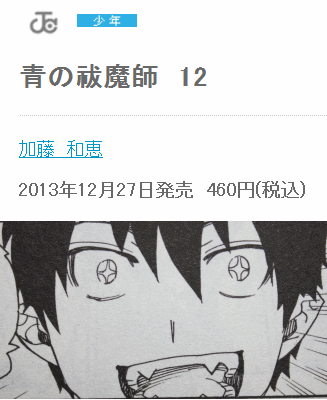
It has been announced that Blue Exorcist 12 comes out in Japan in a little over a month, and I am appropriately excited. As in “this is how I follow my favorite series and I will get an update (aside from unwanted spoilers) for the first time in five months” excited. ^_^
But there’s vocabulary in that screenshot that’s helpful for everyone, so let’s spread the joy!
青の祓魔師 is the title of the series, and 加藤 和恵 (かとう かずえ) is the author. The words in the last line are more useful for a general audience:
- 年(ねん) year
- 月(がつ) month
- 日(にち) day
That’s how you write dates, from big units to small units. 日 can have different pronunciations depending on the number in front of it, but it’ll be spelled 日 no matter what.
- 発売(はつばい) release, putting up for sale
An important word if you ever need to know when something comes out in Japan. “Release date”, incidentally, is 発売日(はつばいび). Googling (title) (volume number, if applicable) 発売日 and then scanning for dates will usually do the trick, provided the release date is already public.
発売 is only for products that go on sale, though. If you need an air date/time for a TV show, try 放送開始(ほうそうかいし) for the first episode of a new show or 放送時間(ほうそうじかん) for an ongoing one. (放送 broadcast; 開始 start; 時間 time)
Movies often use 公開(こうかい), literally “public opening”. 映画(えいが) is the general word for movie, but if it’s based off of a series or something you say “Series Title 劇場版(げきじょうばん)” for “Series Title: The Movie”.
- 円(えん) yen
- 税込(ぜいこみ) tax included (税 tax; 込 to put in)
The price, followed by either (税込) or (+税) depending on whether tax is included.
That’s all. Off to go bask in the impending joy.

豚[ぶた] pig


北 【きた】(kita): North
東 【ひがし】(higashi): East
南 【みなみ】(minami): South
西 【にし】(nishi): West
I recently realized that I could not remember well all the kanji about compass directions. And, since they are usually among the basic kanji (asked in jplt n5), I decided to create a simple graphic post to remember them. Hope it can help you, too!
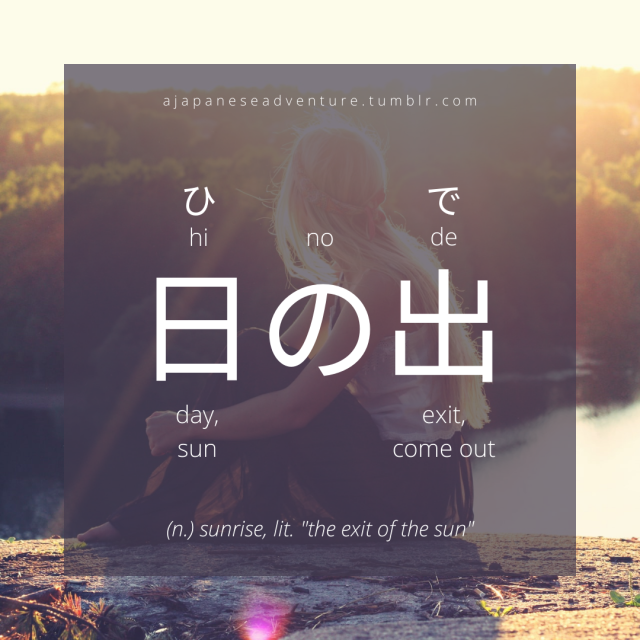

日の出(hinode) and 日の入り(hinoiri),sunrise and sunset.
Interesting thing, the “setting” sun is for the Japanese an “entering” sun, while the “rising” sun is an “exiting” sun.
It seems that we Westerners refer to what the sun does in relation to the sky, while the Japanese refer to what the sun does in relation to the earth.
Background photos by 1) Julia Caesar on Unsplash, 2) Photo by Heshan Perera on Unsplash.

晴れ 【はれ】(hare): clear weather, fine weather
女 【おみな】(onna): woman, female
I found this word watching Weathering with you. One of the main character of the anime is Hina, a ‘sunshine girl’ with the power of bringing sunny weather. 晴れ女 can be literally translated 'sunshine girl’, or 'sunny weather woman’.

雨 【あめ】(ame): rain, rainy weather
女 【おみな】(onna): woman, female
雨女 literally means 'rain girl’ or 'rainy weather woman’. 雨女 (Ameonna) is also a legendary female spirit, described as a goddess from China’s Mount Wushan, who is a cloud in the morning and rain in the evening.
Source: Jisho.org
Background photos: 1) 邱 严onUnsplash; 2) Photo by Tianshu LiuonUnsplash.

和 【わ】 (wa):sum; harmony, peace; Japan, Japanese style.
Example words:
和歌 【わか】 (waka) ->waka, classic Japanese poem (歌 = “song”).
英和 【エイワ】 (eiwa)-> English-Japanese, English-Japanese dictionary (英 = “English”, “Britain”).
Fun fact: I found this kanji in the fantasy series Avatar, the last airbender. You can usually see it in the opening credits, associated with the element air and the air nomads, a nation of wise monks.
Background photo by Nicki Eliza Schinow on Unsplash.
Words and translation: Jisho.org

巫女 【みこ】 (miko): a shrine maiden in shintoist temples, a sorceress, a shamaness. The second kanji 女is not read, but it means “woman”. The overall meaning is “shrine maiden, shamaness”.
I recently learned about the existence of this fascinating figure, the miko. Miko are the young women working in shintoist temples in Japan. In ages past they also had the role of shamanesses and prophetesses.
Thinking about it, I had already seen this figure in one famous anime, Your Name (kimi no na wa). In the movie, in fact, we see the main character, Mitsuha, performing ritual dances in a shrine with her sister, while wearing the traditional mikodress.
I found the miko fascinating. Think about it: in the morning you have these girls as your normal classmates, and at evening you see them at the temple, working in the shrine and performing ritual dances. Maybe for us westerners it just gives a weird and beautiful impression to see the sacred in everyday life, especially in young people.
Background Photo by Denise MetzonUnsplash

The kanji for “storm, tempest” is a very interesting one - It’s actually made by two kanji, one on top of the other: the kanji above means “mountain”, the one below means“wind”.
Mountains are often a forge of storms: this is why it’s always good to check the weather forecasts before go hiking on mountaineous terrains. Thunderstorms may form over the peaks, as warm, moist air rises along the slopes and condenses in thunderclouds, also creating strong wind gusts.
Furthermore, strong windstorms often happen downwind of mountain ridges. In fact, mountains are responsible for “downslope windstorms”.
Of course, this is just my interpretation of the kanji shape. It helps remember it, though!
This word can also be interpreted in a metaphorical way as “uproar”or“winds of change”.
source:jisho.org
background photo: pixabay.com

天下(tianxia) is a Chinese phrase with the meaning “All under Heaven”, “All under the Sky”. It is an ancient Chinese cultural concept, originally denoting the geographical world or the metaphysical realm of mortals. The term becam later associated with political sovereignty, being tianxia all the space, land and area divinely appointed to the Emperor of China (called 天子, tianzi, “the Son of Heaven”).
In Japanese, 天下 is read てんか, てんが or てんげ (tenka, tenga, tenge); another form of this word is 天の下, あめのした (ame-no-shita) which also means “all under heaven”: it indicates the whole word or country, and also takes on the more political meaning of “ruling power”.
Kanji meaning:
天 : heavens, sky, imperial
下 : under, down, below
天 has different readings in Japanese. Usually the on'yomi reading is ten(テン), but the kun'yomi reading is ame, ama- (あめ、あま-).
Interesting enough, ame is also the kun'yomi reading for “rain” (雨).
I’m always trying to find new and interesting ways to learn Japanese. However, I’m just a beginner, an adventurer of language! If you spot an error, feel free to point it out, I will try to correct it as soon as possible!
You may also be interested in these posts:
Weather - Part 1, by @ajapaneseadventure.
I’m always trying to find new and interesting ways to learn Japanese. However, I’m just a beginner, an adventurer of language! If you spot an error, feel free to point it out, I will try to correct it as soon as possible!
From Up on Poppy Hill, Down To the Rumbling Sea

Let’s learn some vocabulary about the sea, by looking at the beautiful lyrics of Sayonara no Natsu from “From Up on Poppy Hill”. The first part of the post introduces some vocabulary (kana only), the second part focuses on one word (kanji).
I grew up on a hill with a view on the sea. From my hometown, during clear days, I could see a line at the horizon, bluer than the sky, and a shining city below it.

What a beautiful city. I am especially fond of the harbour area: a row of low, brightly colored houses on one side, and a forest of floating masts on the other. The lighthouse standing out against the summer sky, the air filled with the echoes of seagulls and the gentle blows of the water on the ships’ flanks. The kiss of the sun; the salt on the breeze.
Maybe this is one possible reason why I love “From up on Poppy Hill” so much: the beautiful world in which the story is set remembers me so much of my little world by the sea.
Some Sea Side Vocabulary! (Kana only)

The beauty of that world is well captured, in my opinion, in the song Sayonara no Natsu(さよならの夏,The Summer of Goodbyes). Down here I wrote some “sea side” vocabulary I learned from the song and from my japanese course. In this first part I only use hiragana and katakana alphabets and no kanji: at the moment, in fact, I’m more focused on learning the “sound” of the language.
- うみ(umi): the sea, the ocean. うみなり(uminari) is the rumble/roar of the sea, from the verb なる (naru), “to sound, to roar, to rumble”. Another verb to use with umi?ひかる (hikaru), “to shine, to glitter, to be bright”;
- ふね (fune): ship, boat, vessel, seaplane. こぶね(kobune) also appears in the lyrics: it’s a compound of ko(which means small) and fune (which is turned to bune in this case) and thus it means “small boat”;
- なみ (nami): wave. It appears in the famous word tsunami(つなみ), where tsu means “port, harbor”. A tsunami is a wave that attacks the harbor;
- カモメ (kamome): gull, seagull. I found it written in katakana, so it’s probably a loanword, although I’m not sure which origins it could have;
- さかな (sakana): fish.
Kanji of the day!
Today’s kanji is:
海 (umi): the sea, the ocean.
(Interesting enough, Umi is also the name of the movie’s main character - which I find beautiful!)

I hope you enjoyed the post as much as I enjoyed learning some Japanese vocabulary about the sea! If you are interested, you can check this post on some vocabulary I learned by watching the movie “From up on Poppy Hill”.
Pictures (from the web): FROM UP ON POPPY HILL (2011), by Goro Miyazaki, STUDIO GHIBLI.
P.S.: I am just a beginner student of Japanese. If you are more experienced with the language and want to point out an error, feel free to let me know, and I will correct the error as soon as possible!


